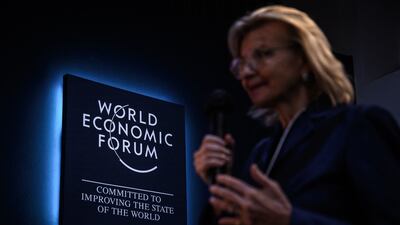The small Swiss mountain town of Davos – population just more than 11,000 – is gradually going back to normal after the annual World Economic Forum came to a close yesterday. Its delegates, world leaders, officials, business people and academics are returning to their offices, many of them back to the most stressful challenges they have faced in years.
The hope is that forums such as Davos, which for so long were on hold during the pandemic, act as fleeting hubs to discuss solutions to these problems. It is no surprise, then, that this year's agenda was dominated by the climate crisis, economic challenges from supply chains to food markets and the conflict in Ukraine.
Many conversations were unnervingly clear about the difficulties ahead. German Chancellor Olaf Scholz described the invasion of Ukraine as: "an attempt to blast us back to a time when war was a common instrument of politics, when our continent and the world were without a stable peaceful order."
Others spoke of opportunities to be seized in uncertain times. Speaking about the future of work after Covid-19, Ohood Al Roumi, UAE Minister of State for Government Development and the Future, said the country's new working week in government entities strengthened "well-being, family bonds and economic growth".
Health was still on the agenda. Bill Gates, co-founder of Microsoft, spoke about the Bill and Melinda Gates Foundation's partnership with US drugs giant Pfizer, one that he hopes could pave the way for a high-tech malaria vaccine. As a new wave of previously well-treated diseases, such as monkeypox and hepatitis, emerges in the aftermath of Covid-19, it is right the world's most powerful figures keep global health high on the agenda.
Perhaps most important of all, many more called for de-escalation in a world where today's tensions must urgently be offset with co-operation. In an interview with The Associated Press, John Kerry, America's special envoy for climate change, said the US and China, both crucial to solving the climate crisis, could help each other: “Maybe we can help with technology of some kind to help China move faster. Maybe China could help us better understand some things we could do better.”
The Middle East was the subject of some discussion too, but less of a priority than in recent years. The foreign ministers of Jordan and Saudi Arabia called for an end to politics of the status quo in the region, saying that only then can intractable issues such as the Palestinian peace process, Syria's civil war and an ongoing refugee crisis be solved. There was optimism, particularly when it came to the Gulf. The UAE's Minister of State for Foreign Trade, Dr Thani Al Zeyoudi, announced that trade between his country and Israel exceeded $2.5 billion in less than two years. Bahrain's Minister of Finance and National Economy, Sheikh Salman bin Khalifa, said his country's already noticeable growth was picking up pace in 2022, with non-oil revenue playing a crucial role. But while Saudi Arabia's finance minister Prince Faisal bin Farhan said the outlook for the wider Mena region was "generally positive", significant vulnerabilities remain, particularly when it comes to rising food prices and population growth with not enough jobs to match.
A quieter pace might be returning to Davos today. But overhead, delegates will be flying back to global capitals with renewed understanding about the scale of the challenges ahead. It can only be hoped that they have a better idea of where solutions lie, too.


